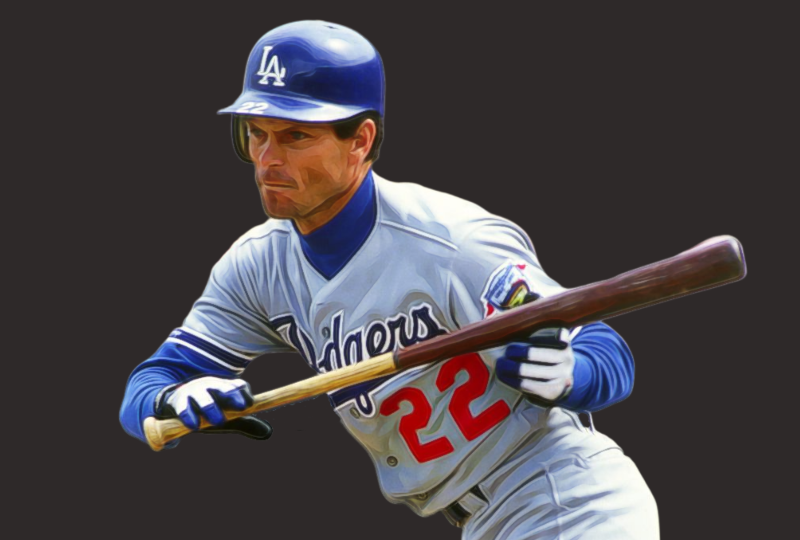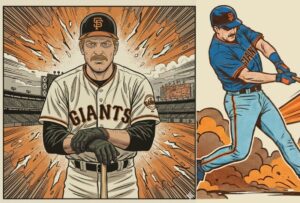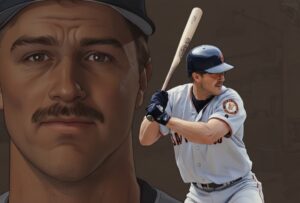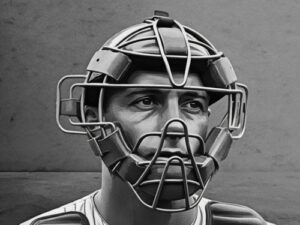One of the most unique players in baseball history, Brett Butler was not of his time, he was like a time traveler from another era. While baseball was pumping itself up with dumbbells, Butler was a puny little guy, a sliver of a man who looked like he could disappear down the drain in the clubhouse showers.
Butler weighed only 140 pounds when he played outfield for his high school team in Illinois. When he told his teammates he planned to play college baseball, the coach laughed at him. But Butler earned his way onto the team at Southeastern Oklahoma State University, a second-tier college tucked away on the southern border of the state, the same place Dennis Rodman haunted. In college, Butler looked like a junior high kid who wandered onto the wrong field, until the games started. He set school records for batting average, hits, home runs, and runs scored. He was named to the NAIA All-America team twice. He ate hamburgers and sucked down milk shakes, beefing himself up to 160 pounds, and the Braves drafted Butler in the 23rd round of the 1979 amateur draft. Unheralded, his career prospects were not bright.
Unheralded prospect
Scouts have a system to evaluate players, a ratings score they file in their reports to the parent club. The system goes from 20 to 80, in categories like hitting, power, arm strength, speed, and so on. The most important rating is future projection, the rating that predicts how likely a prospect will make the major leagues. Butler ranked above average in one area: speed. Otherwise, he was a long shot to make The Show. But there was no way to measure his heart.
Butler was an outstanding minor league player. He outplayed everyone on his team in Rookie ball, and each time the Braves sent him to a new league to test him, he passed with flying colors. In 1980 he batted .330 with 120 runs scored and 80 stolen bases in the Atlanta farm system. The following season he jumped two levels to Triple-A and batted .335 with 44 steals and 93 runs in 125 games for Richmond. He contended for a batting title in nearly every league he played in. That earned him a promotion to Atlanta. He was 24 years old when he played in the majors for the first time and he played his final big league game when he was 40.
Traded to Cleveland Indians
In 1983 the Braves were challenging for a second straight division title in August and the piece they were missing was a top starting pitcher. The team went out and grabbed flamethrower Len Barker from the Indians for the stretch drive and agreed to send two players to Cleveland after the season. Butler was one of those players. His future in Atlanta had been in doubt, since he played the same position as Dale Murphy. Manager Joe Torre didn’t think much of Butler either, he preferred power from his lineup.
Butler stole 52 bases his first year in Cleveland and settled in as their leadoff man. By the time he was eligible for free agency, Butler was a baseball unicorn: a singles-hitting outfielder. While home run records were being broken, Butler was a throwback to the deadball era when pipsqueaks chopped the ball into the ground, bunted for hits, and manufactured runs. Butler signed with the Giants, where for the first time he was entrusted to set the table for a powerful lineup. In three seasons in San Francisco, Butler batted .293 and averaged 106 runs and 42 stolen bases. In 1989 he helped the team to the World Series.
The Dodgers gave Butler more than $12 million to play four years in LA, where Butler kept churning those little legs, slapping the ball around the field. He was the best bunter the game had seen since Rod Carew. One season he had 29 bunt hits, the highest total since reliable data has been available. Consistently a .300 hitter, Butler added value through his handling of the bat.
Overcame cancer
Fans loved Butler, in large part because he looked like them instead of a powerlifter. In 1996, during his second stint with the Dodgers, Butler overcame cancer to return to the big leagues, continuing to play well.
When he was 36 he reached base in 32 consecutive games, when he was 38 he went 11-for-12 in stolen base attempts, when he was 40 years old, Butler played 49 games in center field and batted .283 with 15 stolen bases. He was still about 160 pounds, still a quick little guy proving everyone wrong. He finished with more than 2,300 hits, 1,300 runs scored, and 500 stolen bases. His career on-base percentage as a leadoff man (.378) ranks in the top 20 all-time among leadoff hitters in at least 750 games. His high school baseball coach laughed at his aspirations, but Butler got the last laugh, playing 17 seasons in MLB and earning All-Star status.






